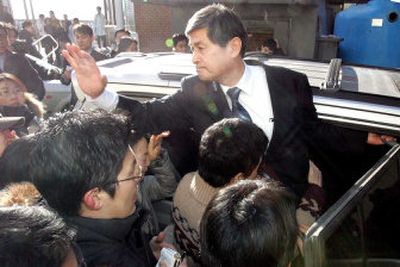Fraud worries U.S. scientists

WASHINGTON – The unwelcome but indisputable revelation that some of the most exciting biomedical claims of the past few years were the product of scientific fraud settled like a cloud over the American scientific community Friday.
Stem cell researchers said they were depressed and discouraged to learn that an investigatory panel at Seoul National University had found that most of the precious human embryonic stem cell colonies that its scientists had touted were fakes.
The star scientist at the heart of that deception – Hwang Woo Suk – resigned Friday from his university post, his meteoric rise to fame coming to a wrenching and ignominious end.
Many researchers said they are worried about the political impact of the debacle in the United States, where the Senate is poised to consider several bills that could boost or restrict stem cell research. Although controversial because it involves the destruction of human embryos, the science has had generally high approval ratings with the public because of all the medical promise the cells are thought to hold.
Yet scientists vowed Friday to learn from the experience and move ahead with renewed vigor, saying they still see the field as extremely promising.
“Although it hurts, I think we have to say that if there is fraud of any kind … it has to be exposed, no matter what the cost,” said John Gearhart, a stem cell researcher at Johns Hopkins Medical Institutions in Baltimore.
“We’ll have to deal with the cynicism and anything that comes our way politically from the policy-makers,” Gearhart added.
The investigation is ongoing at the Seoul university, but a panel there announced late Thursday it had found overwhelming evidence that at least nine of 11 colonies of stem cells described in a high-profile report this spring either never existed or were never proved to be stem cells. The colonies were said to have been derived from embryos that were clones of 11 patients, marking the first alleged proof that it might be practical to create custom-designed stem cells to treat disease.
With Congress out for the holiday break, there was no immediate reaction from Capitol Hill. But opponents of the research clearly saw the disaster as a political plus, and they said it reveals how little evidence there is for stem cells’ value.
“It’s all very well to say one scandal shouldn’t set back the field, but Hwang’s team was the field,” said Richard Doerflinger, deputy director of pro-life activities at the U.S. Conference of Catholic Bishops, in an e-mail. “If his results are false, then after seven years of attempts worldwide no one has succeeded in getting even the first step in ‘therapeutic cloning’ to work on a practical scale. At what point do legislators stop throwing away good money after bad?”
Others took the opposite tack, saying that although fraud can happen anywhere and anytime, it would be less likely to occur in the stem cell arena if that field were not so heavily restricted in this country.
“Probably the strongest research oversight system in the world is at the National Institutes of Health, but they are pretty much on the sidelines” because of restrictions imposed by President Bush in 2001, said Sean Tipton, president-elect of the Coalition for the Advancement of Medical Research. “If you don’t allow the best American scientists to do the best – and best overseen – research, you force it overseas and into the private sector, and this is the result.”